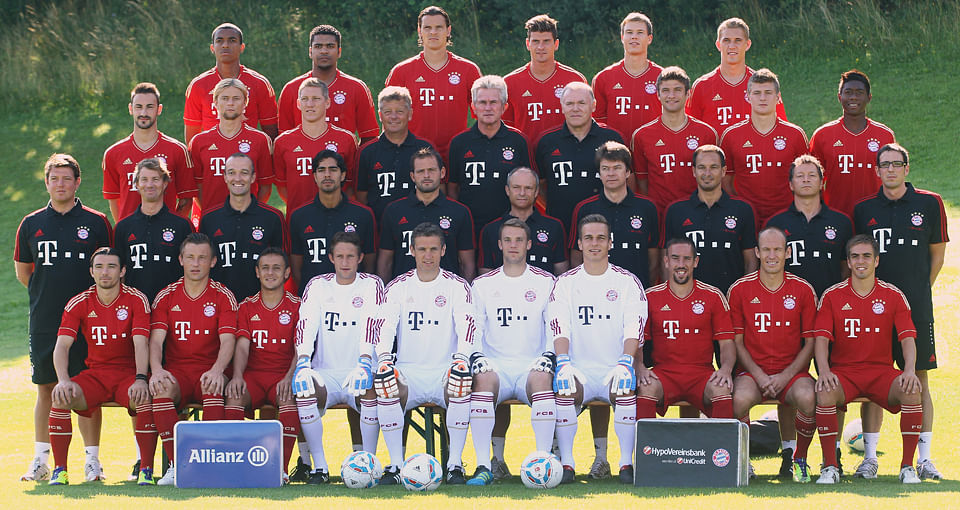The decision to construct a new stadium was driven by the club's desire to create a modern, purpose-built facility that could better accommodate the growing demands of the modern game. The project was a massive undertaking, requiring years of planning, design, and construction, but the end result has been nothing short of spectacular.
The Tactical Masterminds Behind Bayern Munich's Success

One of the most iconic figures in Bayern's history is Udo Lattek, who took charge of the club in the 1970s and helped to shape the team's trademark possession-based approach. Lattek's tactical acumen and ability to get the best out of his players were instrumental in Bayern's dominance during that era.
By leveraging its global brand, business acumen, and sporting expertise, Bayern can position itself as a trailblazer for innovation in the industry, setting new benchmarks for sustainability, social responsibility, and fan experience. Through a proactive approach to embracing change and driving progress, Bayern Munich can lay the foundation for continued success and relevance in an ever-evolving football landscape.
As the club continues to evolve and adapt to the challenges and opportunities of the modern game, Bayern Munich must stay true to its core values of ambition, professionalism, and community to ensure sustained success and relevance in the years to come. By nurturing talent, embracing innovation, and fostering a culture of excellence, Bayern can build on its storied legacy and inspire future generations of fans, players, and football enthusiasts around the world. Bayern Munich is not just a football club; it is a symbol of perseverance, passion, and the pursuit of greatness – a legacy that will endure for another century and beyond.
The 1990s saw the arrival of another legendary coach, Giovanni Trapattoni, whose strategic flexibility and commitment to defensive solidity helped Bayern to weather a period of transition and emerge as a force to be reckoned with once again.
The Allianz Arena's Unique Features
The Allianz Arena is renowned for its cutting-edge design and innovative features. One of the most striking aspects of the stadium is its external facade, which is composed of 2,874 pneumatic cushions that can be illuminated in a variety of colors, creating a mesmerizing display that can be seen for miles.
Bayern Munich's Home Ground: The Allianz Arena and its Significance
The Birth of the Allianz Arena
The Allianz Arena, Bayern Munich's current home ground, is a true architectural marvel that has become an iconic symbol of the club's success and ambition. Opened in 2005, the stadium was built to replace the aging Olympiastadion, which had served as Bayern's home since the 1970s.
The stadium's retractable roof and movable pitch also add to its versatility, allowing it to host a wide range of events, from football matches to concerts and other large-scale gatherings. Additionally, the Allianz Arena boasts state-of-the-art facilities, including luxurious VIP lounges, expansive concession areas, and a comprehensive transportation network, ensuring that the match-day experience for fans is second to none.
Bayern Munich's Iconic Players: From Beckenbauer to Lewandowski

The Impact on German Football
The rivalry between Bayern Munich and Borussia Dortmund has had a profound impact on the landscape of German football, raising the overall standard of play in the Bundesliga and pushing both clubs to constantly strive for greatness.
The appointment of Pep Guardiola as Bayern's manager in 2013 marked a significant shift in the club's playing philosophy. Guardiola's obsession with possession and his emphasis on tactical versatility transformed Bayern into a sleek, dominant machine, capable of adapting to any challenge with ease.
Bayern Munich is a name that has become synonymous with success in the world of football. As one of the most decorated and celebrated clubs in the game, Bayern has cemented its place as a true powerhouse, not just in Germany, but across Europe and the globe. From its humble beginnings to its current status as a footballing juggernaut, the story of Bayern Munich is one of unwavering determination, strategic brilliance, and an unparalleled commitment to excellence.
The resilience of this rivalry lies in the deep-seated passion and pride that both sets of supporters have for their respective clubs, with each victory or defeat carrying immense significance and bragging rights. As Bayern and Dortmund continue to evolve and adapt to the ever-changing landscape of modern football, one thing remains certain – the fierce rivalry between these two titans will endure, driving them to new levels of excellence and success.
The stadium's cutting-edge design and world-class facilities have helped to solidify Bayern's reputation as one of the most modern and well-run clubs in the world. It has also served as a platform for the club to showcase its brand and engage with its ever-growing international fan base, cementing its position as a truly global entity.
The Next Generation of Bayern Legends
As Bayern Munich looks to the future, the club's renowned youth academy continues to produce a steady stream of promising young talents, ensuring that the tradition of excellence will be carried on for generations to come. Players like Jamal Musiala, Alphonso Davies, and Serge Gnabry have already emerged as the next wave of Bayern superstars, their youthful exuberance and raw talent hinting at the continued dominance of the Bavarian club.
By instilling a sense of ambition, discipline, and unity across all levels of the organization, Bayern can create a sustainable framework for success that transcends individual players, coaches, or seasons. This holistic approach to building a winning culture will not only help Bayern maintain its dominance on the pitch but will also solidify its reputation as a global footballing powerhouse with a legacy of sustained excellence.
By seamlessly integrating the business and sporting aspects of the organization, Bayern has been able to create a virtuous cycle of success, where on-field triumphs translate into commercial and financial rewards, which are then reinvested into the club to fuel further growth and dominance. This holistic approach to the business of football has helped to solidify Bayern's position as one of the most well-run and successful organizations in the industry, serving as a blueprint for other clubs aspiring to achieve similar levels of success.
Through strategic partnerships, targeted marketing campaigns, and a strong digital presence, Bayern has been able to extend its reach far beyond the confines of Germany, establishing a loyal following in Asia, the Americas, and beyond. This global brand recognition has not only boosted the club's commercial revenues but has also allowed it to attract some of the most sought-after players and sponsors in the industry, further strengthening its position as a true powerhouse of the game.
One of the key drivers of Bayern's financial prowess has been its ability to attract and retain some of the world's most marketable players, whose global appeal and on-field performances have translated into lucrative sponsorship and endorsement deals. This, combined with the club's prudent financial management and strategic investments, has enabled Bayern to consistently outspend and outperform its competitors, further cementing its status as a footballing superpower.
Beckenbauer's graceful, sweeping style and his ability to dictate the tempo of the game made him a feared opponent and a beloved figure among Bayern fans. Alongside him, the prolific goal-scoring exploits of Gerd Müller cemented his status as one of the greatest strikers of all time, with his unparalleled positioning and clinical finishing securing countless victories for Bayern.
The Modern Superstars
As the decades passed, Bayern Munich's ability to attract and develop world-class talent has remained undiminished. The turn of the 21st century saw the rise of a new generation of superstars, led by the likes of Phillip Lahm, Bastian Schweinsteiger, and Thomas Müller.
The 1970s saw the emergence of other legendary figures, such as Sepp Maier, the club's legendary goalkeeper, and Uli Hoeness, a midfield maestro who would go on to become a renowned club director and president, guiding Bayern to continued success.
The Global Reach of the Bayern Munich Fan Base
Bayern Munich's success has not been limited to the domestic arena; the club's global appeal has seen its fan base expand far beyond the borders of Germany. Through strategic marketing initiatives, a strong social media presence, and the consistent success of the team on the pitch, Bayern has managed to cultivate a devoted following in every corner of the world.
Embracing Innovation and Sustainability
In an era marked by rapid technological advancements, shifting consumer behaviors, and growing environmental concerns, Bayern Munich must also embrace innovation and sustainability as core pillars of its future strategy. From investing in eco-friendly stadium infrastructure to adopting digital technologies for fan engagement and commercial growth, Bayern can lead the way in setting new standards for environmental responsibility and operational efficiency in football.
The Legends of the Past
Bayern Munich's history is filled with a pantheon of legendary players who have left an indelible mark on the club and the sport of football as a whole. At the forefront of this illustrious group stands the iconic Franz Beckenbauer, a true pioneer of the game who revolutionized the role of the defender.
Whether it's the thunderous roar that fills the Allianz Arena on match days or the sea of red and white that greets the team on their travels, the Bayern fans have become an integral part of the club's identity. Their dedication, combined with their deep-rooted connection to the city of Munich and the Bavarian region, has helped to forge a sense of community and shared purpose that is truly unique in the world of football.
These devoted fans have not only contributed to the team's success on the pitch but have also played a crucial role in shaping the club's identity and values. Through their tireless efforts to uphold the traditions of Bayern Munich and to foster a sense of community among supporters, the ultras have become the heart and soul of the fan base, inspiring generations of fans to come.
Becoming a Global Powerhouse
As the decades passed, Bayern Munich continued to cement its status as one of the most influential and successful clubs in world football. The club's unwavering commitment to excellence, coupled with its ability to attract and develop world-class talent, has allowed it to maintain its dominance both in Germany and on the European stage.
The Modern Tactical Masterminds
In the 21st century, Bayern Munich has continued to attract some of the most talented and innovative coaches in the game. Jupp Heynckes, who led the team to a historic treble in 2013, was renowned for his ability to blend pragmatic tactics with a free-flowing attacking style, allowing Bayern to overwhelm opponents with their sheer quality and tactical flexibility.
See more:web hit club
Establishing Dominance in the Bundesliga
The formation of the Bundesliga, the top professional league in Germany, in 1963 marked a pivotal moment in Bayern Munich's history. The club quickly established itself as the dominant force, winning the first Bundesliga title in the 1965-66 season and going on to secure a record-breaking 30 league championships to date.